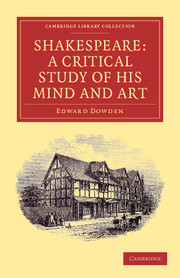Book contents
- Frontmatter
- PREFACE
- Contents
- CHAPTER I SHAKSPERE AND THE ELIZABETHAN AGE
- CHAPTER II THE GROWTH OF SHAKSPERE'S MIND AND ART
- CHAPTER III THE FIRST, AND THE SECOND TRAGEDY; ROMEO AND JULIET; HAMLET
- CHAPTER IV THE ENGLISH HISTORICAL PLAYS
- CHAPTER V OTHELLO: MACBETH: LEAR
- CHAPTER VI THE ROMAN PLAYS
- CHAPTER VII THE HUMOUR OF SHAKSPERE
- CHAPTER VIII SHAKSPERE'S LAST PLAYS
CHAPTER VI - THE ROMAN PLAYS
Published online by Cambridge University Press: 29 August 2010
- Frontmatter
- PREFACE
- Contents
- CHAPTER I SHAKSPERE AND THE ELIZABETHAN AGE
- CHAPTER II THE GROWTH OF SHAKSPERE'S MIND AND ART
- CHAPTER III THE FIRST, AND THE SECOND TRAGEDY; ROMEO AND JULIET; HAMLET
- CHAPTER IV THE ENGLISH HISTORICAL PLAYS
- CHAPTER V OTHELLO: MACBETH: LEAR
- CHAPTER VI THE ROMAN PLAYS
- CHAPTER VII THE HUMOUR OF SHAKSPERE
- CHAPTER VIII SHAKSPERE'S LAST PLAYS
Summary
The two books which contributed the largest material towards the building-up of Shakspere's art-structure were the Chronicles of Holinshed, a quarry worked by the poet previous to 1600; and North's translation of Plutarch's Lives, a quarry worked after 1600. To this latter source we owe Julius Cæsar, Coriolanus, Antony and Cleopatra, and, in part, Timon of Athens. Shakspere treated the material which lay before him in Holinshed and in Plutarch with reverent care. It was not a happy falsifying of the facts of history to which he, as dramatist, aspired, but an imaginative rendering of the very facts themselves. Plutarch he follows even more studiously and closely than he followed Holinshed. Yet it is to be noted that, while Shakspere is profoundly faithful to Roman life and character, it is an ideal truth, truth spiritual rather than truth material, which he seeks to discover. His method, as critics have pointed out, is widely different from that of his contemporary, Ben Jonson. Mr Knight, treating this subject, has said, “Jonson has left us two Roman plays produced essentially upon a different principle. In his Sejanus there is scarcely a speech or an incident that is not derived from the ancient authorities; and Jonson's own edition of the play is crowded with references as minute as would have been required from any modern annalist. … His characters … are made to speak according to the very words of Tacitus and Suetonius; but they are not living men.”
- Type
- Chapter
- Information
- Shakespeare: A Critical Study of his Mind and Art , pp. 276 - 336Publisher: Cambridge University PressPrint publication year: 2009First published in: 1875

